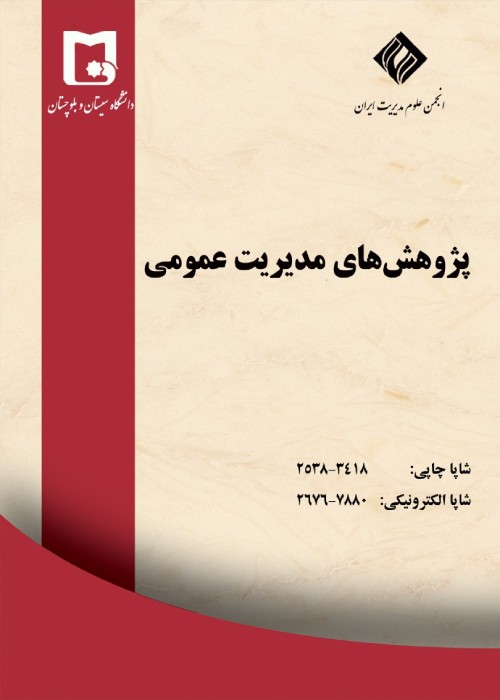Entrepreneurial University Agility Model with Knowledge Management Approach
Author(s):
Article Type:
Research/Original Article (دارای رتبه معتبر)
Abstract:
Today, attention to entrepreneurship is one of the important concerns of institutions and centers, including universities. University, as a living human system, needs agility to flourish and learn from changes, so that the change is a natural and inevitable part of organizational life, not a separate sector and a threatening event. The purpose of this study was to present a model of agility in an entrepreneurial university with a knowledge management approach. The research is based on the objective, applied, qualitative approach (based on systematic data collection), using the theory-based method of data. The statistical population of the study consisted of professors from academics and experts in human resources management, entrepreneurship and knowledge management. The sample was selected with the aim of reaching theoretical saturation through a snowball targeted sampling. Finally, the sample included 25 subjects. Data gathering from key informants was conducted using exploratory interviewing method and data analysis based on the theory of data, using theoretical coding. The resulting pattern indicates that the main category that leads to the agility outcomes of the entrepreneurial university is the agility requirements of the Entrepreneurial University for enrichment, customer satisfaction, and the provision of solutions to them. Through agility and agility enablers, power was seen by the agility of the organization at the entrepreneurial university with a knowledge management approach.
For Guerrero and Erbano (2014), the Entrepreneurial University is the foundation of the knowledge economy. That is, an entrepreneurial university has a knowledge-based approach. In other words, knowledge management encourages employees, students and professors to create and share the sharing of knowledge and ideas for value added products (projects, research, laboratory results, and in general academic entrepreneurship). Considering the importance of organization agility in entrepreneurial university as a learning organization, this study seeks to design an organization agility model at an entrepreneurial university with a knowledge management approach.
Introduction
The term agility in the dictionary means fast, agile, fast and easy moving, and the ability to think fast with a clever method used to react to changes in the environment and exploit those changes as opportunities. Has been introduced (Hornby et al, 2000). Mates & Yakalan (2005) defined agility as follows: the ability of an organization to discover (identify) changes (which can be opportunities or threats or a combination of them) in their business environment and give an answer quickly focusing on customers and stakeholders through reorganization, resources, processes and strategies. An organization that is designed in an agile manner has a unique organizational structure. Therefore, for their success and survival, organizations need to create a position, system and structure that will benefit both from its human resources capacity and commitment to continuous learning at all levels of the organization, and will lead to continuous acquisition and effective use of new knowledge. One of these organizations is the University of Entrepreneurship. Today, attention to entrepreneurship is one of the important concerns of institutions and centers, including universities. The entrepreneurial university theory is one of the models proposed to explain the new role of universities with the important feature of broader engagement with the community. According to this theory, some higher education systems are coordinated with changes in their programs, with economic development and labor market, and by implementing entrepreneurship projects at universities, innovative graduates and Educate Creative. One of these programs is the agility of the entrepreneurial universities (Gibb, 2012).The United Nations Scientific and Cultural Organization (2004) described the new universities as one of the 21st century global higher education: "The place where entrepreneurship skills in higher education are designed to alleviate the capabilities of graduates and to become the founders of work develops.” Zhang et al. (2016) argue that universities are no longer part of separate knowledge, but are institutions engaging increasingly in business with business partnerships. Higher education is increasingly associated with social developments, and especially economic ones. Research and development activities of other universities cannot be considered. Instead, purely academic activities have become part of the three or quadruple knowledge of silicon (Miller et al., 2016; Mok, 2013; Sperrer et al., 2016).For Guerrero and Erbano (2014), the Entrepreneurial University is the foundation of the knowledge economy. That is, an entrepreneurial university has a knowledge-based approach. In other words, knowledge management encourages employees, students and professors to create and share the sharing of knowledge and ideas for value added products (projects, research, laboratory results, and in general academic entrepreneurship). Considering the importance of organization agility in entrepreneurial university as a learning organization, this study seeks to design an organization agility model at an entrepreneurial university with a knowledge management approach.
Marerials and Methods
This research is based on the purpose of the application and from the qualitative approach and research strategy of the Foundation Data Theory. Founded in 1967 by Barney Glaser and Anselm Stroud, the foundation data theory was developed and published in their famous book The Discovery of Data Theory (Glaser & strauss, 1967). The data analysis step is based on the theory-based data approach, using the theoretical coding. "Theoretical coding is a method for analyzing data that has been compiled in order to formulate a theory in the theory of data." To analyze data, a theoretical coding consisting of three steps is used, which are: "Open coding", "axial coding" and "selective coding". This process is a three-step (but non-linear) process, which gives the main and primary content of the titles, and then they fall under the categories of concepts and categories (Creswell, 2005; Corbin and Strauss, 2014). The statistical community of this study consists of all the experts who can participate in this research. In this research, a sample of 25 people was selected through a snowball targeted sampling. The criteria for selecting individuals in this sample were based on researches and articles that they had done in the field (agility, entrepreneurship, academic entrepreneurship and knowledge management). Hence, in this research, first, based on the research papers and articles of the initial selection participants (experts who have at least one scientific research paper or a research project or a book on agility, entrepreneurial university, university entrepreneurship and knowledge management) and then with using the experiences of the first contributors to the next participant was selected. At this stage, the sampling was created in two forms of theoretical saturation: first, because the concepts had a repetitive state and the second was repeatedly redefined by new concepts because of the broader concepts. In order to collect data and information needed for research, several tools including snippets and interviews were used. Documents and resources were examined and checked out. Exploratory interviewing tools have been used to collect information from key informants.
Data analysis and findings
The first step in analyzing data is based on the theory of data generated by open coding. In this research, in the coding stage, the data from the interviews were coded in a row to the row for extraction of the initial concepts, and then the resources available to the entrepreneurial university and available resources in the field of agility were also coded. In the present study, a total of 882 concepts or open sources were obtained. Subsequently, common and similar concepts (semantic codes) were categorized in the form of 34 main concepts. These concepts have a higher level of abstraction and are an important stage in generating data-driven theory. After the open coding operation, at the pivotal coding stage, common and similar concepts (codes) in terms of meaning in the form of four major categories Four Stages of Knowledge Nonaka Model (2001) Knowledge and Colleagues are categorized into four sub categories: agility empowerment, agility stimuli, agility capabilities, and agility outcomes. In the selective coding step, the selected core category should be considered and the relationship between all major categories around the core of the core category should be examined and then the underlying model (based on the data) is drawn based on the storyline. In the present study, after several readings and returns between data, concepts, codes and categories, one main category is most often seen in their data and interviews. This category is the central category or core of the present research, which includes the agility requirements of the Entrepreneurial University for enrichment, customer satisfaction, and the provision of solutions to them. The conditions and interactions discussed in the form of a pattern were based on the Grounded Theory.
Conclusion
Based on the results obtained according to the Grounded Theory and confirmation of the opinions of agility experts in the entrepreneurial university, KM approaches four stages of knowledge creation, four components and 34 main concepts. An agile entrepreneurial university should identify the drivers of change in its environment in order to identify the capabilities needed to deal with these stimuli, as well as the tools needed to realize these capabilities. The agile entrepreneurial university also needs a series of capabilities to deal with the stimulus of change. On the other hand, agility empowerment is a tool that is necessary for the fulfillment of agility capabilities at the university. Finally, the implications of agility utilization in the entrepreneurial university are the production of quality products and services, academic entrepreneurship, intellectual property, patents and inventions. According to previous studies, many models and conceptual frameworks for the development of agility have been presented by researchers, and in each of these models, agility components have been introduced.Keywords:
Language:
English
Published:
Management Researches, Volume:12 Issue: 43, 2019
Pages:
185 to 204
magiran.com/p1999441
دانلود و مطالعه متن این مقاله با یکی از روشهای زیر امکان پذیر است:
اشتراک شخصی
با عضویت و پرداخت آنلاین حق اشتراک یکساله به مبلغ 1,390,000ريال میتوانید 70 عنوان مطلب دانلود کنید!
اشتراک سازمانی
به کتابخانه دانشگاه یا محل کار خود پیشنهاد کنید تا اشتراک سازمانی این پایگاه را برای دسترسی نامحدود همه کاربران به متن مطالب تهیه نمایند!
توجه!
- حق عضویت دریافتی صرف حمایت از نشریات عضو و نگهداری، تکمیل و توسعه مگیران میشود.
- پرداخت حق اشتراک و دانلود مقالات اجازه بازنشر آن در سایر رسانههای چاپی و دیجیتال را به کاربر نمیدهد.
In order to view content subscription is required
Personal subscription
Subscribe magiran.com for 70 € euros via PayPal and download 70 articles during a year.
Organization subscription
Please contact us to subscribe your university or library for unlimited access!



